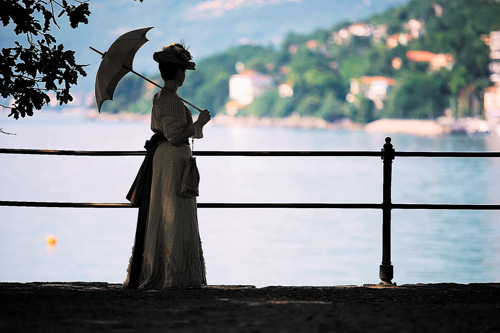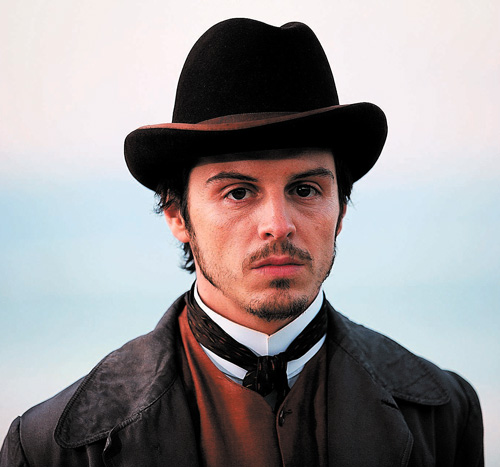‘The Duel’
There's an old saying I've been hearing since my childhood days: "I'm so happy I could kill myself."
That contradictory comment perfectly captures the mixed emotions in the works of Anton Chekhov.
The great Russian playwright also wrote great short stories and novellas; one of the latter, 1891's "The Duel," inspires a not exactly great, yet still worthwhile, adaptation.
It's lovely to look at, with glorious scenery, elaborately detailed sets and costumes that reflect its 19th-century setting.
Its cast of crisp British and Irish thespians (many of whom will be familiar to faithful viewers of PBS' "Masterpiece Theatre," "Mystery!" and the like) deliver precise -- and, in a few cases, genuinely poignant -- interpretations.
And Georgian-born Israeli director Dover Koshashvili -- who made a ruefully amusing debut with 2001's "Late Marriage" -- expertly captures the indolent, vaguely dissatisfied mood that remains a Chekhov hallmark.
After all, these are people who are so happy they could kill themselves.
Unless, of course, they kill each other -- which seems a likely prospect in a movie called "The Duel."
The movie takes us to an uncharacteristically sunny outpost in gloomy Russia: a Black Sea resort where the insects outnumber the tourists. (Croatia's Istrian coast supplies the appropriately scenic backdrop.)
It's here that Laevsky (Andrew Scott) -- a minor Russian bureaucrat with vague dreams of getting back to the land -- has run off with his mistress Nadia (Fiona Glascott ).
The coquettish Nadia happens to be married to a much older man who's (conveniently) just died. But Laevsky can't bring himself to tell Nadia the news -- because that might mean he'd have to marry her himself. And, as he explains to his only friend, understanding doctor Samoylenko (Niall Buggy), he no longer loves her.
To his credit, Laevsky feels a smidgen of guilt for putting Nadia in this position. He'd undoubtedly feel less remorse if he observed her flirting -- and more -- with other locals, from a shopkeeper to a police officer. But Laevsky's too busy boozing, playing cards and desperately trying to fend off financial ruin to pay much attention to Nadia.
In short, he's the sort of self-indulgent, oversensitive wastrel destined to clash with his opposite number: Von Koren (Tobias Menzies), an arrogant zoologist who, as a forward-looking man of science, has no use for the lazy Laevskys of the world.
Their inevitable clash explains "The Duel's" title.
As usual in Chekhov, however, it's the reactions -- and the interactions -- surrounding the main narrative that really tell the tale.
Director Koshashvili revels in the movie's sumptuous surroundings, using stately tracking shots to explore the languid atmosphere -- and multiple mirror images to suggest the characters' internal conflicts.
But debut screenwriter Mary Bing's adaptation never truly conveys the heart of the conflict between Laevsky and Von Koren. Each man represents a way of looking at the world -- Laevsky standing for traditional privilege, Von Koren embodying a new (and unforgiving) survival-of-the-fittest attitude.
Ideally, the two characters -- and their competing philosophies -- should balance each other. But Bing's script keeps Von Koren on the sidelines too much of the time, so when "The Duel's" title confrontation finally does occur, it seems largely unmotivated.
As a result, the movie's focus remains squarely on the maddening Laevsky -- who's hardly a conventional, or sympathetic, figure. Scott evokes his weak, sniveling side with startling ferocity, but often comes perilously close to overwrought hysteria, undercutting our ability to identify, or empathize, with Laevsky's self-made misery.
By contrast, Glascott deepens Nadia's self-absorption with a haunting desperation. And, as the town doctor -- resigned to his fate, yet still managing to care as well as carry on -- Buggy creates "The Duel's" most, well, Chekhovian figure.
Which somehow seems fitting.
After all, "The Duel" focuses on people whose lives never quite work out the way as intended. So it makes perfect sense that a movie about them wouldn't quite work out as intended either.
Contact movie critic Carol Cling at ccling@reviewjournal.com or 702-383-0272.
Review
"The Duel"
95 minutes
NR; sexual references, nudity, violence
Grade: B-
at Village Square
Deja View
Anton Chekhov's plays and stories have inspired hundreds of cinematic adaptations -- some faithful, some updated. A few favorites:
"Summer Storm" (1944) -- Director Douglas Sirk's Hollywood adaptation of Chekhov's story "The Shooting Party" stars Linda Darnell as the Russian siren who triggers tragedy for a judge (George Sanders) -- and, ultimately, herself.
"Lady With a Dog" (1960) -- An award-winning Russian adaptation of the same Chekhov tale that inspired Marcello Mastroianni's 1987 "Dark Eyes," about the doomed romance between two vacationers -- one middle-age, one young, both married to others.
"The Seagull" (1975) -- Frank Langella, Blythe Danner, Olympia Dukakis, Kevin McCarthy and Lee Grant headline this made-for-TV adaptation of an acclaimed Williamstown Theatre Festival production.
"Vanya on 42nd Street" (1994) -- In director Louis Malle's final film, actors (led by Julianne Moore, Brooke Smith, Andre Gregory and Wallace Shawn) assemble at a crumbling Broadway theater to rehearse Chekhov's "Uncle Vanya."
"Living Out Loud" (1998) -- Two Chekhov short stories inspire writer-director Richard LaGravenese's warm, bittersweet comedy about a Manhattanite (Holly Hunter), deserted by her doctor husband (Martin Donovan), who finds new allies (Danny DeVito, Queen Latifah) in life.
-- By CAROL CLING
















